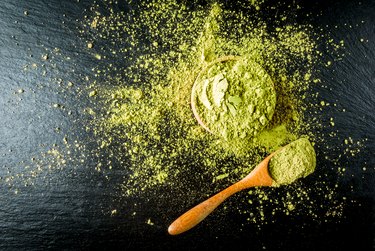
Rich in polyphenols, green tea extract has strong antioxidant, anti-inflammatory and lipid-lowering properties. Its side effects, although mild, are associated with the caffeine in green tea pills. Despite its health benefits, this stimulant may cause jitters, heart palpitations and insomnia.
Tip
The caffeine content in green tea extract varies among brands. Some pills have little or no caffeine, while others exceed 200 milligrams per serving.
Video of the Day
Green Tea — A Natural Stimulant
Struggling with fatigue, low energy and poor mental focus? A cup of green tea might be exactly what you need to feel like yourself again. This natural beverage has been hailed for its health benefits for centuries. Loaded with antioxidants, it protects against heart disease, diabetes, weight gain and even cancer.
Video of the Day
A January-April 2017 review published in the Journal of Oral and Maxillofacial Pathology (JOMFP) discussed the potential benefits of green tea. As the researchers note, this drink is rich in catechins that reduce oxidative stress and inflammation, support cardiovascular health and inhibit the proliferation of cancer cells. Furthermore, it may help prevent digestive disorders, neurodegenerative diseases, high blood pressure and other ailments.
Read more: 10 Everyday Ailments Soothed by Tea
In addition to flavonoids and other antioxidants, green tea contains amino acids, caffeine, vitamins and minerals. One cup provides 50 to 100 milligrams of caffeine, as reported in the above review.
This natural stimulant is clinically proven to increase muscle strength and endurance, leading to enhanced exercise performance. It may also improve your mood and alertness, boost your cognitive skills and energize your body, according to a research paper published in the Ohio Journal of Science in May 2015.
Considering its high caffeine content, green tea can be considered a natural stimulant. It's also a good source of B vitamins, which further enhance its energizing effects. Your body needs these nutrients to metabolize carbs, fats and amino acids, so that it can convert them to energy. Green tea extract is just as potent, delivering antioxidants, vitamins and caffeine in a concentrated form.
Green Tea Extract Caffeine Content
Any green tea extract side effects are largely due to its caffeine — which is also a component that provides health benefits. The caffeine content varies from one tea brand to another.
As mentioned earlier, there are anywhere between 50 and 100 milligrams of caffeine in one cup of green tea. Brewed coffee, on the other hand, boasts around 95 to 165 milligrams of caffeine, notes the Mayo Clinic. Surprisingly, the same source states that brewed green tea contains just 25 to 29 milligrams of caffeine per cup — that's significantly higher compared with the numbers provided by the JOMFP review.
This difference is most likely due to the wide range of green tea brands available. Tea origin, processing method and brewing time all come into play.
The same goes for green tea pills. Their caffeine content varies among manufacturers. Here are some examples:
- Lightly Caffeinated Mega Green Tea Extract (Life Extension): 725 mg of green tea extract and 25 mg of caffeine per serving
- Caffeine 200 mg Plus Green Tea Extract (Nature's Truth): 20 mg of green tea extract and 200 mg of caffeine per serving
- Green Tea Extract (NOW Foods): 400 mg of green tea extract and up to 32 mg of caffeine per serving
- Green Tea (Jarrow Formulas):500 mg of green tea extract and 40 mg of caffeine per serving
As you see, green tea extract caffeine content varies significantly from one brand to the next. Some products have as little as 25 milligrams of caffeine, while others exceed 200 milligrams. If you're sensitive to stimulants, consider using decaffeinated green tea pills.
Read more: How to Flush the Body of Caffeine
Is Caffeine Safe?
This natural stimulant is prized for its ability to reduce body fat, improve mental focus and ward off fatigue. As the experts at Harvard Health Publishing note, caffeine acts on the central nervous system, increasing your energy and alertness. Its effect peaks within an hour or so after consumption.
According to a November 2018 review featured in the journal Nutrients, ingesting up to 400 milligrams of caffeine per day is unlikely to cause adverse reactions in healthy adults. When consumed in moderation, this stimulant may protect against chronic illnesses. Therefore, the caffeine in green tea pills is pretty much safe.
It's important to note that some people are sensitive to caffeine, however. People who metabolize caffeine quickly, for example, may consume large amounts of coffee and caffeinated beverages without experiencing side effects. Those who metabolize it at a slow rate may have trouble sleeping even when they consume small amounts.
Read more: 8 Non-Caffeine Ways to Boost Your Energy
Harvard Health points out that caffeine may raise blood pressure when consumed in large doses.
Depending on the brand, green tea extract may contain more or less caffeine than a cup of tea. If coffee gives you the jitters and palpitations, green tea pills will likely have a similar effect. To stay safe, choose a decaffeinated brand or try not to exceed 400 milligrams of caffeine per day.
- Journal of Oral and Maxillofacial Pathology: "Probable Benefits of Green Tea With Genetic Implications"
- British Journal of Sports Medicine: "Wake up and Smell the Coffee: Caffeine Supplementation and Exercise Performance — An Umbrella Review of 21 Published Meta-Analyses"
- Ohio Journal of Science: "Impact of Various Caffeine Vehicles on Mood and Cognitive, Neurpological and Physiological Functions Over Five Hours"
- Harvard.edu: "B Vitamins"
- Mayo Clinic: "Caffeine Content for Coffee, Tea, Soda and More"
- Life Extension: "Lightly Caffeinated Mega Green Tea Extract"
- Nature's Truth: "Caffeine 200 mg Plus Green Tea Extract"
- NOW Foods: "Green Tea Extract"
- Jarrow: "Green Tea"
- Harvard.edu: "The Buzz About Caffeine and Health"
- Nutrients: "Caffeine in the Diet: Country-Level Consumption and Guidelines"
- MedlinePlus: "Caffeine"